PeekMed
Orthopedic surgery residency is one of the most competitive residencies medical students apply to. Some residency programs receive several hundred applications annually, due to the large number of applications submitted by each applicant. Let’s analyze what are the characteristics and benefits of the orthopedic surgery residency program and the consequent specialty.
How long is an orthopedic surgery residency?
In the US, an orthopedic surgery residency has a length of 5 years, with the option of additional training in a subspeciality fellowship. This is a longer training length compared to other residencies, which signals a higher level of demand.
According to the American Academy of Orthopedic Surgeons (AAOS), the most common fellowships are Orthopedic oncology, Total joint and adult reconstructive surgery, Spine, Hand surgery, Foot and ankle, Sports medicine, Trauma, and Pediatrics. These take at least 1 year. However, it is noteworthy that a fellowship is not required to practice orthopedic surgery, although it is more common to do one to become an expert in a subspecialty.
How many orthopedic surgery residency spots exist?
As reported by AAOS, there are around 150 accredited orthopedic residency programs. As said previously, orthopedic surgery residency applicants outnumber available spots. In 2022, there were approximately 1400 applicants for over 700 spots.
In 2023, these applicants will be able for the first time to express their specific preferences for up to 30 programs at the moment of the application to help manage demand versus supply of spots.
Why is there so much interest in orthopedic surgery residency?
According to Medscape Orthopedist Compensation Report 2022, one of the most rewarding parts of orthopedics is personal fulfillment. Whether in the form of a relationship with the patients or by personally enjoying the immediate problem resolution. As pathologies are physical and create great constraints on the quality of patients' lives, there is instant gratification in ‘repairing’ someone instead of dealing with chronic problems.
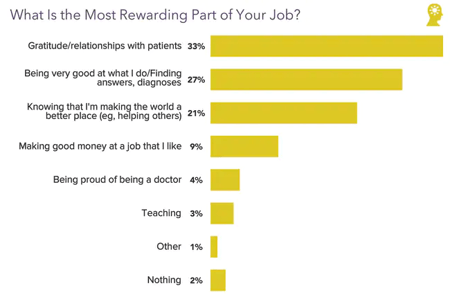
Source: www.medscape.com
In addition, there is another important factor that helps medical students choose orthopedics as their specialty: the salary, which ranks 4th in orthopedists’ job satisfaction.
How much does an orthopedic surgeon earn?
For the ones who want to choose orthopedics because of the salary, there is great news! But before you are earning like an orthopedic surgeon, you will receive a resident salary. According to Medscape Residents Salary & Debt Report 2022, the average resident salary is around $64.200 with a noticeable 16% rise between 2015 and 2022.
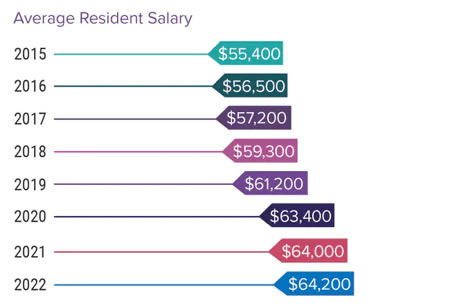
Source: www.medscape.com
The salary also changes according to the residency year. The values of the graphic are based on the average of every medical residency specialty. You can see that there is a 17% difference between the first year's salary and the sixth to eighth year. When you finish the residency program, the salary increases more.
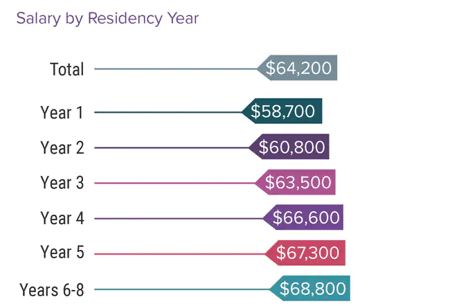
Source: www.medscape.com
In terms of base salary and total compensation, orthopedic surgeons are the second top earners of all medical specialties with an average of $557.000. It is important to consider that the salary you earn may depend on the subspecialty you choose.
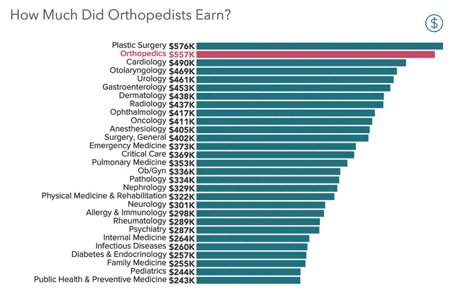
Source: www.medscape.com
Although we all enjoy a good salary, there are two other factors that are crucial for the quality of life: time and job satisfaction. As said before, orthopedists consider this profession to be very rewarding as it is gratifying to help people with serious physical problems. This can be done with surgery or with non-surgical procedures.
How often an orthopedic surgeon performs surgery and how do they manage their time?
If you think you will always be in the operating room after the residency program, sorry for disappointing you. That is not true!
Normally, non-surgical maintenance of injuries or diseases is only responsible for part of your time as an orthopedic surgeon. So, you should be prepared to spend half of your time in the doctor’s office. Orthopedic surgeons that work in a hospital don’t select their cases and patients according to their agenda.
However, we also have good news! Orthopedists spent less (14 hours per week) than the average time (15.5 hours per week) handling paperwork and doing administrative tasks.
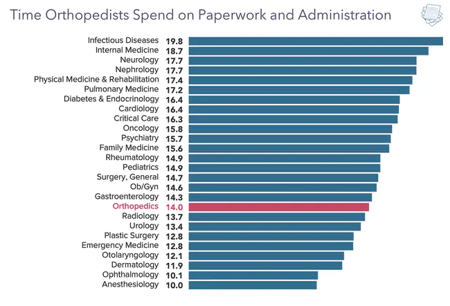
Source: www.medscape.com
Hospital employment is good for surgeons who want predictable hours and freedom from the stress of managing their own practices. However, working for a hospital means your schedule and activities are dictated. You can get some freedom to manage your time if you work at a clinic.
One of the best ways for orthopedic surgeons to optimize their time is through a pre-operative planning system that allows them, regardless of their professional experience, to plan a surgery automatically in a matter of seconds, following existing and upcoming guidelines, and reducing the chances of error and miscalculations.
If you are looking to apply for an orthopedic surgery residency, we wish you good luck. If you are still not convinced that orthopedics might be for you, 97% of orthopedists would choose their specialty again. This is a big proof of how rewarding is!
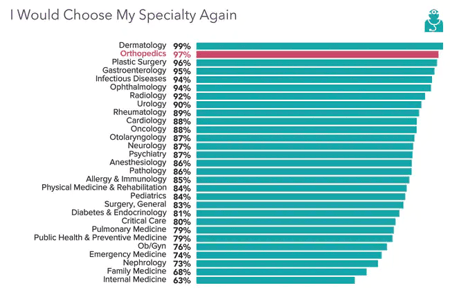
Source: www.medscape.com
Being an orthopedic surgeon takes a lot of hard work, but it also gives a whole new level of self-realization to you, the one who embraces and enjoys this work.



